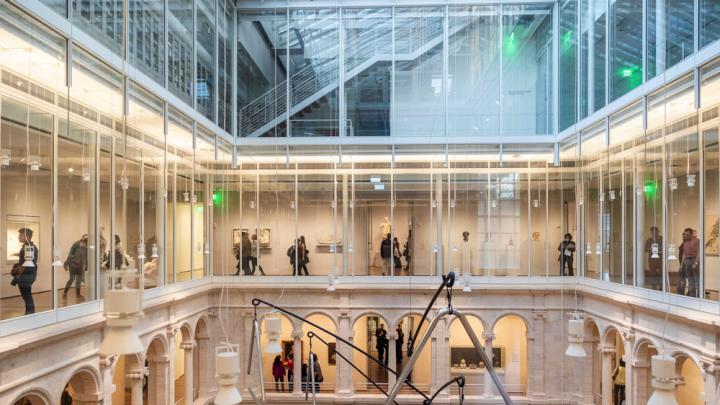The Harvard Art Museums (HAM) announced this morning that all visitors will be admitted free of admission charges, effective immediately. Until this change, adults were charged $20 for access to the collections, and those over 65 years, $18. To be sure, there have been many opportunities to use the museums for free: all visits on Sundays, all students with valid identification, all Harvard ID holders (plus one guest), anyone under the age of 18, and all Cambridge residents with proof of residency. The free Sundays program was introduced in September 2021, when the museums reopened after the pandemic closure, and free access the last Thursday evening of each month began in April 2022. (Capacity limitations were ended that April 14.) During 2022, the number of visitors exceeded 150,000, with an estimated 85 percent gaining access for free.
Nonetheless, the new policy represents a meaningful expansion of free public access to HAM’s extensive permanent collections, exhibitions, and research materials, and perhaps a broader statement about the role of an academic art museum in serving the community at large. In the news announcement, President Lawrence S. Bacow said, “Art is for everyone, and the Harvard Art Museums will now be free to all visitors. This initiative ensures that every visitor to our campus will have the opportunity to view and engage with the phenomenal collections in our care.” (The Yale Art Gallery, the major such institution in New Haven, is free and open to the public, and admission is also free to the Princeton University Art Museum.) It comes as no surprise that Bacow would demonstrate his support for the arts in the waning days of his administration: he and his wife Adele Fleet Bacow made a gift of a Steinway Grand Piano, in honor of their parents, as part of the opening of the Tufts music deparment's Granoff Music Center, in 2007, and they were the featured honorands at the American Repertory Theater's annual gala this May—in recognition of President Bacow’s role in championing the new ART facilities planned for Allston.
According to the museums, the free Sunday and Thursday evening programs have each proven popular, with significant growth in usage and a pronounced increase in the number of first-time visitors (at a time when many cultural institutions have found it difficult to maintain, much less expand, their audiences).
“We are thrilled to implement this new comprehensive free admission policy, which will remain in place permanently,” said Martha Tedeschi, Cabot Director of the museums, in the news announcement. “Taking this step represents our deep commitment to serving all audiences, enhancing our mission of teaching and research, and becoming a center where discovery, exchange, inclusion, and learning can flourish for all.”
As for the permanence of the change, the announcement noted the important element of funding: the new policy is made possible by “a generous contribution from the estate of David Rockefeller and support from the Office of the President” of Harvard. Rockefeller ’36, G ’37, LL.D. ’69, made a landmark, $100-million gift to Harvard in April 2008, $30 million of which was designated for the study centers in the new HAM complex, which opened in the fall of 2014. When Christie’s conducted the auction of the collection of Peggy and David Rockefeller in 2018, the estate proceeds from the sale of the 1,500 objects ($835 million) were designated for philanthropies the couple had supported during their lives, including the Council on Foreign Relations, Harvard, the Museum of Modern Art, and Rockefeller University. Those funds and Harvard presidential resources enable HAM’s admission-free policy—an extension of the museums’ educational and outreach missions that David Rockefeller would no doubt have appreciated.







